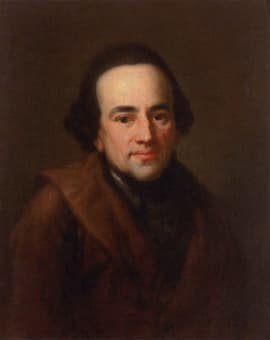
Moses Mendelssohn
On 3 February 1809, Felix Mendelssohn was born in Hamburg into a highly prominent Jewish family. His grandfather Moses Mendelssohn was the “preeminent Jewish philosopher of the Enlightenment in Germany, who had argued for religious tolerance and the assimilation of German Jewry into German culture.” Heinrich Heine wrote, “As Luther had overthrown the Papacy, so Mendelssohn overthrew the Talmud.”
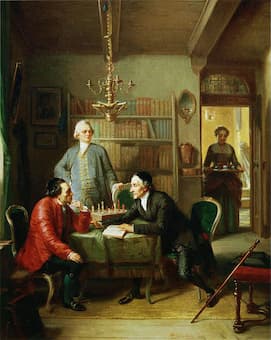
Moritz Daniel Oppenheim: Lavater and Lessing
Visit Moses Mendelssohn (1856)
Destined for a rabbinical career, Moses was regarded as a leading culture figure by declaring that the state has no right to interfere with the religion of its citizens, Jews included. “Brothers,” he wrote in his proclamation of Judaism in a Gentile world, “if you care for true piety, let us not feign agreement, where diversity is evidently the plan and purpose of Providence. None of us thinks and feels exactly like his fellow man: why do we wish to deceive each other with delusive words?” Moses Mendelssohn had six children, but only his second-oldest daughter Recha and his eldest son Joseph retained the Jewish faith. His daughter Brendel, who later married Friedrich von Schlegel, converted to Catholicism, and Felix Mendelssohn’s father Abraham converted to Protestantism.
Felix Mendelssohn: Piano Sonata No. 1 in E major, Op. 6
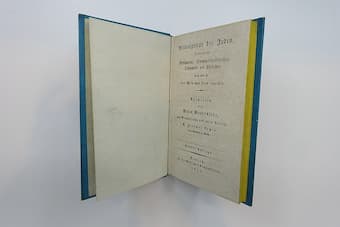
Mendelsohn’s Ritual Laws of the Jews, 1826 edition, in the collection
of the Jewish Museum of Switzerland
Moses Mendelssohn also established himself as a leader in the Berlin textile industry, which formed the foundation of his family’s wealth. His sons Abraham and Joseph established the Berlin banking firm J. & A. Mendelssohn in 1804. In the same year, Abraham married Lea Salomon, granddaughter of the wealthy court banker Daniel Itzig.
Abraham opened a bank branch in Hamburg, where he settled with his wife, and where three of their four children were born. Fanny was born in 1805, Felix in 1809, and Rebecka in 1811.
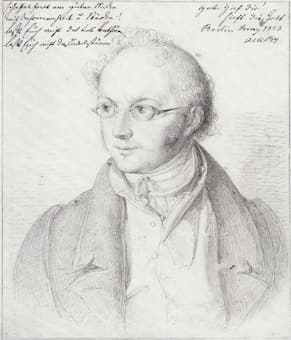
Abraham Mendelssohn
When Napoleon proclaimed the continental blockade against England in 1806, Abraham Mendelssohn was forced to flee with his family to Berlin, arriving in July 1811. The Mendelssohn children grew up in a highly intellectual environment. Visitors to the salon organized by their parents included the poets Heinrich Heine and Karl von Holtei, Ludwig Börne, the philosopher Hegel, the classicist August Böckh, and the scientist Alexander von Humboldt. It has been said the “Europe came to their living room.” Extraordinarily talented, much of the early musical education of Felix and Fanny Mendelssohn was in the hands of their mother Lea. She had received piano lessons from the Bach student Johann Philipp Kirnberger, and was considered a “very good pianist and an outstanding Bach connoisseur.”
Felix Mendelssohn: Piano Quartet No. 1 in C minor, Op. 1 (Klimt Quartet)
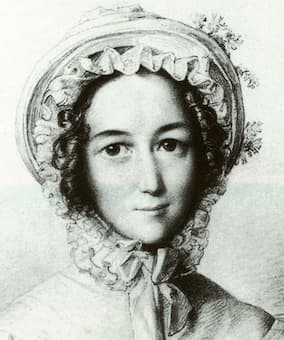
Lea Salomon Mendelssohn
Lea had great admiration of the music of Mozart, Haydn, and Beethoven, and as the first piano teacher of her children “she appointed future teachers with great knowledge and in accordance with their own aesthetic convictions.” When the family visited Paris in 1816 and 1817, the children took lessons with Marie Bigot, whose technique had been admired by both Haydn and Beethoven.
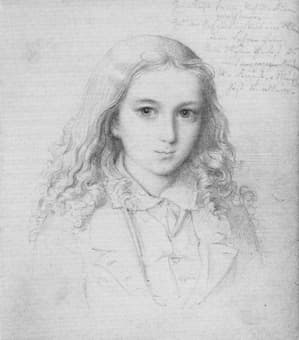
The young Felix Mendelssohn
In April 1817, their aunt Dorothea von Schlegel reported “Felix played with genius and Fanny with a virtuosity beyond all comprehension.” Felix began his piano studies with Ludwig Berger, a former student of Clementi, and in October 1818 he first appeared in public, performing with two horn players in a trio by Joseph Wölf. In the same year he performed Dussek’s “Military Concerto” from memory, “but this accomplishment was eclipsed by Fanny’s rendition from memory, at the age of 13, of 24 preludes from Bach’s Wohltemperirte Clavier. Felix added violin and organ lessons in May 1819, and by June of that year was taking music theory, counterpoint and composition lessons from the director of the Berlin Singakademie, the famed Carl Friedrich Zelter. Felix’s earliest compositions date from around that time.
Felix Mendelssohn: “Lieb und Hoffnung” (Die Singphoniker)
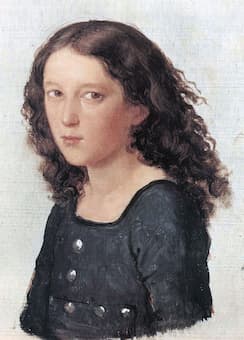
Felix Mendelssohn
In addition, his general education advanced rapidly. By 1821 he was reading Caesar and Ovid, and studying history, geography, arithmetic and French. He was also working on a Singspiel entitled Die Soldatenliebschaft, with the libretto arranged from a French vaudeville. Felix completed the score, consisting of an overture and 11 numbers in December 1820. It was fully staged with orchestra in a special theatre constructed in a hall of the Mendelssohn home on 3 February 1821, on the composer’s 12th birthday.
A second Singspiel was completed and performed six weeks later, and Felix also produced a number of sacred choral works, six sinfonias for strings, a Piano Sonata in G minor, numerous fugues for string quartet, his third Singspiel, and also a wedding cantata for a cousin. By the time Felix reached his 14th birthday, he already had an impressive variety and number of works in his compositional portfolio. In fact, between 1821 and 1823 alone, he composed a total of 12 symphonies for strings. He soon began to work on his 13th string symphony, but after completing the first movement, decided that he was ready to tackle a symphony for full orchestra. The teenage composer quickly assembled a composition that skillfully synthesized Baroque techniques and Classical forms. At the same time, the work integrated contemporary orchestral techniques and symphonic processees. The C-minor Symphony was his first orchestral work to be published, and it received its premier performance on 25 May 1824 in London. This performance, arranged by Sir George Smart—one of the founding members of the London Philharmonic Society—permanently secured Mendelssohn’s reputation in England.
For more of the best in classical music, sign up to our E-Newsletter
Felix Mendelssohn: Symphony No. 1 in C minor, Op. 11
